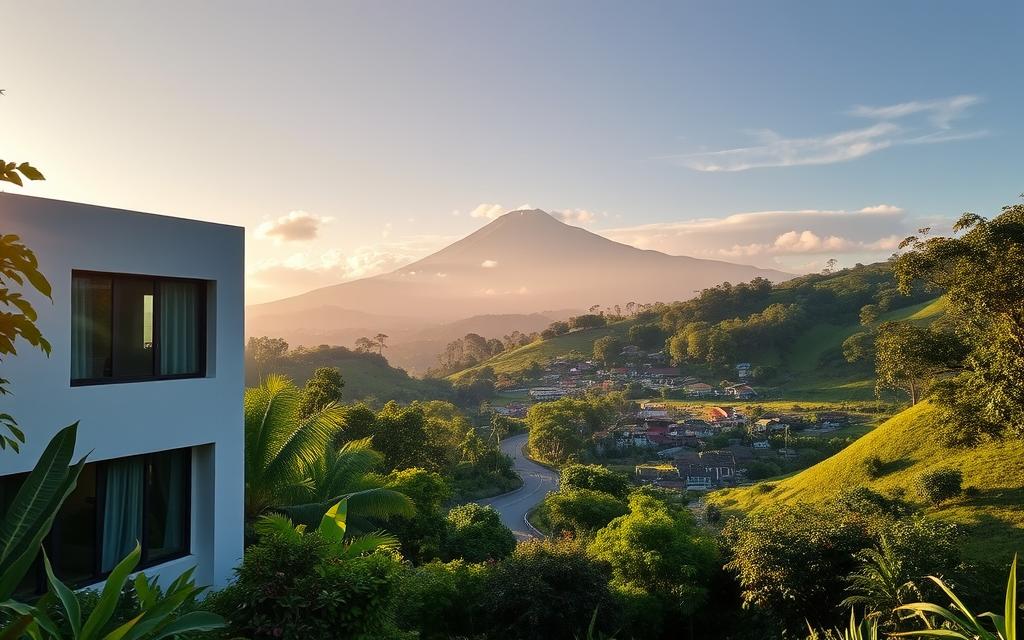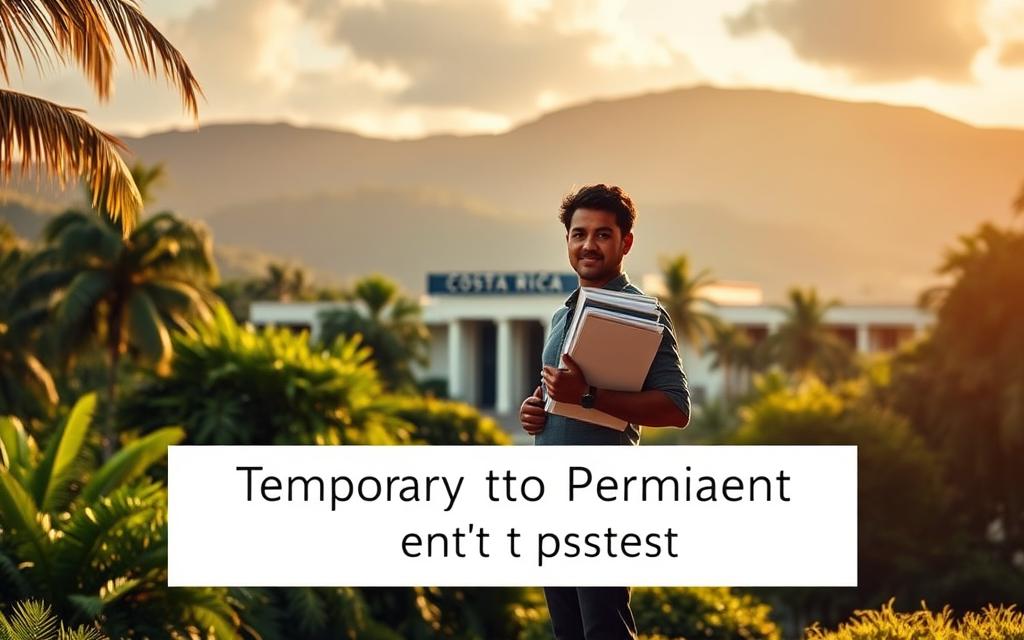How to Transition from Temporary to Permanent Residency in Costa Rica

Did you know that over 500,000 foreigners have chosen Costa Rica as their new home? This Central American gem has become a top destination for those seeking a better quality of life. Its stunning landscapes, warm climate, and welcoming culture make it an ideal place to settle.
Our guide provides clear, step-by-step advice on navigating the immigration process. Whether you’re exploring temporary or permanent options, we’ll help you understand the legal requirements and necessary documents. Reliable information is key to making your journey smooth and stress-free.
From understanding Costa Rican immigration laws to accessing expert services, this section is your starting point. Let us guide you through every step, ensuring you’re well-prepared for your new life in this beautiful country.
Introduction to Residency in Costa Rica

With its lush landscapes and welcoming communities, Costa Rica attracts people from all over the world. This Central American country is known for its stunning natural beauty, from pristine beaches to dense rainforests. Its warm climate and rich traditions create an inviting atmosphere for those seeking a new home.
The allure of Costa Rica goes beyond its scenery. The country’s vibrant culture blends tradition with modernity, offering a unique lifestyle. Whether you’re drawn to its eco-friendly initiatives or its peaceful way of life, Costa Rica stands out as a top destination for residency.
For those considering a move, the country offers robust support systems. Programs like the Smart Traveler Enrollment Program (STEP) provide essential consular services and emergency assistance. These resources make the transition smoother for expatriates.
In this section, we’ll explore what makes Costa Rica so appealing. From its climate and culture to its support networks, we’ll provide the information you need to understand why so many choose this country as their new home. For more details on the process, visit our guide on how to get residency in Costa.
Understanding Temporary Residency in Costa Rica
Costa Rica offers a variety of temporary residency options for those looking to make this country their home. These programs cater to retirees, investors, and digital nomads, among others. Each option has its own benefits and requirements, making it essential to choose the one that aligns with your goals.
Overview of Temporary Residency Options
The Pensionado Visa is ideal for retirees with a minimum monthly pension of $1,000. For those with a steady income, the Rentista Visa requires $2,500 per month for two years. Investors can opt for the Investor Visa by committing $200,000 to local projects or real estate. Digital nomads, on the other hand, need a monthly income of $3,000 to qualify for their visa.
Each visa type serves as a stepping stone toward permanent residency. Understanding these options is crucial for planning your stay in Costa Rica.
Benefits and Limitations
Temporary residency allows you to live in Costa Rica while exploring its culture and opportunities. It also provides access to local services and healthcare. However, there are limitations. For example, temporary residents can only work in their own businesses until they attain permanent status.
Processing times can range from six months to a year, depending on the visa type and documentation. Missing or incomplete information can further delay the process. Despite these challenges, temporary residency remains a popular choice for many expatriates.
By understanding the benefits and limitations, you can make informed decisions about your residency journey in Costa Rica.
How to Transition from Temporary to Permanent Residency in Costa Rica

The journey to permanent residency in Costa Rica is both rewarding and structured. This section provides a detailed guide to help you navigate the process with confidence. We’ll cover eligibility criteria, legal requirements, and a step-by-step breakdown of the application process.
Eligibility and Legal Requirements
To qualify for permanent residency, applicants must meet specific criteria. These include holding temporary residency for at least three years or having family ties to a Costa Rican citizen. Proof of income, such as a pension or investment, is also required.
Legal requirements include submitting accurate documentation. This includes notarized copies of your passport, proof of income, and a clean criminal record. Adhering to these requirements ensures a smooth application process.
Step-by-Step Process Explained
The first step is to gather all necessary documents. This includes your passport, proof of income, and a criminal background check. Ensure all documents are notarized and translated into Spanish if required.
Next, submit your application to the Costa Rican immigration office. Processing times can vary, so patience is key. Once approved, you’ll receive your permanent residency card, granting you the right to live and work in the country without restrictions.
By following these steps and meeting all legal requirements, you can successfully transition to permanent residency in Costa Rica. This process opens doors to a new chapter in this beautiful country.
Exploring Permanent Residency Options
Costa Rica’s permanent residency programs offer diverse pathways for those looking to settle long-term. Whether you’re drawn by the country’s natural beauty or its welcoming culture, understanding your options is crucial. This section compares two popular programs: Rentista and Investment Residency.
Rentista vs. Investment Residency
The Rentista program is ideal for individuals with a stable income. Applicants must demonstrate a monthly income of $2,500 for at least two years. This option is perfect for those who rely on a steady cash flow rather than significant savings.
On the other hand, the Investment Residency program targets those willing to make a substantial financial commitment. A minimum investment of $150,000 in real estate or local businesses is required. This route appeals to investors seeking long-term opportunities in the country.
Both programs have unique benefits. Rentista residency is straightforward for those with consistent income, while Investment Residency offers potential financial returns. Understanding these differences helps you choose the best fit for your goals.
Legal and administrative processes also vary. Rentista applicants focus on income verification, while Investment Residency requires proof of funds and project details. Navigating these requirements ensures a smoother transition to permanent status.
By exploring these options, you can make an informed decision about your future in Costa Rica. Each program opens doors to a new chapter in this vibrant country.
Preparing Your Residency Documentation

Proper documentation is the cornerstone of a successful residency application in Costa Rica. Gathering and organizing the right paperwork ensures a smooth process and minimizes delays. This section provides essential guidance to help applicants meet all legal and notarial requirements.
Essential Documents and Notarial Requirements
Applicants must submit several key documents to meet Costa Rica’s residency requirements. These include a notarized copy of your passport, proof of income, and a clean criminal background check. Documents issued outside Costa Rica must be apostilled and translated by an official translator.
Health insurance coverage is mandatory for residency applications. Proof of insurance must be included in your submission. Additionally, supporting records like marriage certificates or birth certificates may be required, depending on your application type.
Tips for a Smooth Documentation Process
Start by creating a checklist of all required documents. This ensures nothing is overlooked. Verify each document’s validity and ensure it meets Costa Rican legal standards. Missing or incomplete information can delay your application significantly.
Keep copies of all submitted documents for your records. This helps in case any issues arise during the review process. Following the guidelines provided by the Costa Rican immigration office is crucial for a successful application.
For more detailed information on the Costa Rica residency process, visit our comprehensive guide. Proper preparation and attention to detail can make your journey to residency stress-free and efficient.
Navigating Costa Rican Government and Legal Systems
Navigating the Costa Rican government and legal systems can seem daunting, but understanding their structure simplifies the process. The country’s immigration and residency procedures are managed by specific agencies, ensuring a structured approach for applicants. Familiarizing yourself with these systems is essential for a smooth transition.
Understanding Local Laws and Procedures
Costa Rica’s legal framework is designed to support both locals and expatriates. The immigration office oversees residency applications, while other agencies handle related requirements like health insurance and background checks. National laws ensure transparency and fairness in the process.
Common challenges include navigating language barriers and understanding legal terminology. Working with local legal counsel can help address these issues effectively. Lawyers familiar with Costa Rican law can provide valuable guidance, ensuring compliance with all requirements.
For more detailed insights into the residency process, explore our comprehensive guide. Understanding the government and legal systems empowers you to make informed decisions and achieve your residency goals in Costa Rica.
Practical Tips for a Seamless Residency Transition
Making the move to Costa Rica can be a life-changing experience, but preparation is key. To ensure a smooth transition, it’s essential to leverage expert guidance and community resources. Here’s how you can make the process easier and more efficient.
Leveraging Expert Guidance and Community Resources
Seeking professional legal assistance is one of the most effective ways to navigate the residency process. Local immigration lawyers understand the legal requirements and can help you avoid common pitfalls. For example, services like Costa Rica legal experts provide tailored support to meet your specific needs.
Community resources also play a vital role in easing your transition. Expat groups and online forums offer valuable insights and firsthand experiences. These platforms can help you connect with others who have gone through the same process, providing practical advice and emotional support.
Additionally, government programs like the Smart Traveler Enrollment Program (STEP) are invaluable. They offer emergency assistance and up-to-date information, ensuring you stay informed and prepared throughout your journey.
By combining expert guidance with community support, you can navigate the residency process with confidence. These resources not only simplify the administrative aspects but also help you adapt to your new life in Costa Rica.
Utilizing External Resources and Support Networks
Accessing reliable resources is crucial for a smooth residency process in Costa Rica. Whether you’re gathering documents or meeting legal requirements, having the right support can make all the difference. This section highlights essential tools and services to guide you through the journey.
Information from Official Government and U.S. Embassy Sources
Official government websites and U.S. Embassy resources are invaluable for accurate information. Programs like the Smart Traveler Enrollment Program (STEP) provide timely alerts and emergency assistance. This ensures you stay informed and prepared throughout your residency application.
For U.S. citizens, consular services offer guidance on local laws and requirements. Registering with the U.S. Embassy is often a mandatory step in the residency process. These resources help you navigate the complex legal landscape with confidence.
Private Legal and Immigration Assistance
Private legal services play a key role in ensuring compliance with Costa Rican laws. Experienced immigration lawyers can help you avoid common pitfalls and streamline the application process. Their expertise is especially valuable when dealing with complex documentation or legal challenges.
Many expatriates rely on private assistance to handle property disputes or investment requirements. By working with reputable professionals, you can ensure your application meets all legal standards. This support is essential for a successful transition to residency in Costa Rica.
By leveraging these resources, you can navigate the residency process with ease. Whether through official channels or private services, having the right support ensures a smooth and stress-free experience.
Conclusion
Costa Rica’s clear and structured residency process makes it an attractive destination for those seeking long-term settlement. We’ve outlined the critical steps, from gathering documentation to meeting legal requirements, to help applicants navigate the system with ease.
Moving to this country offers numerous benefits, including access to a vibrant culture, a supportive government, and a high quality of life. By following the guidelines provided, applicants can ensure a smooth transition to permanent status.
We encourage you to seek professional advice and rely on trusted resources throughout your journey. For more detailed information, explore our comprehensive guides. With the right preparation, your new life in Costa Rica awaits.


